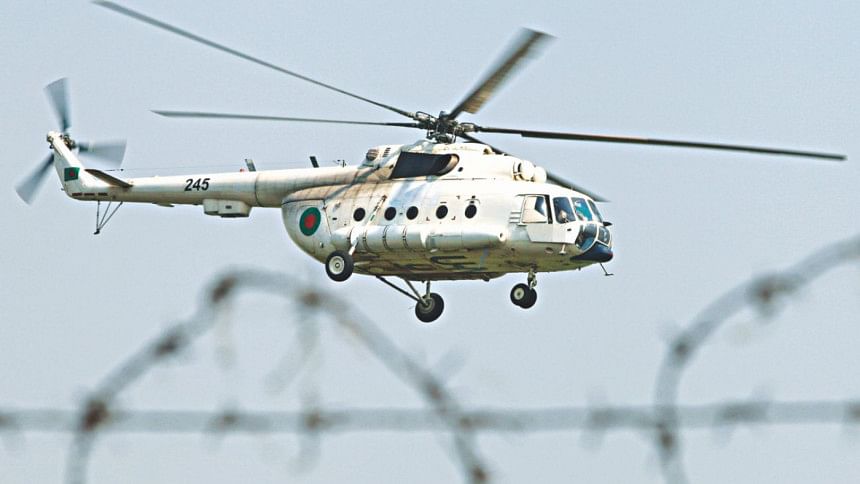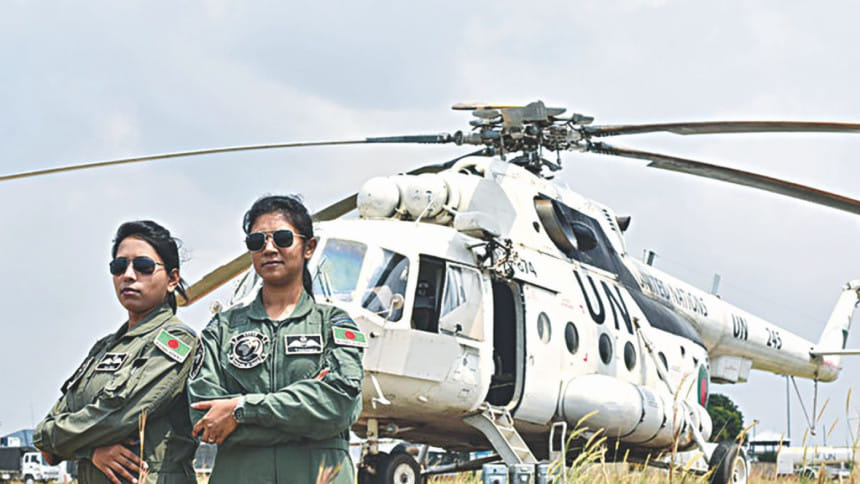Bangladesh Air Force engagement in UN peacekeeping operations

Bangladesh Air Force started contributing to UN peacekeeping operation since 1993 and it created a unique opportunity for BAF to demonstrate her strength, capabilities and experience in the global arena.
Air Force operation is always sophisticated, technical and costly affair with various challenges. When BAF aircraft fly with distressed people, logistic support, evacuation missions, or carries high officials or delegations displaying the flag of Bangladesh on her wing, it obviously demonstrates the contribution of our nation in establishing global peace. It gives us great strength to speak proudly in any world forum and ascertains that the intangible values of Bangladesh are immeasurable compared to tangible ones, and this is only possible through UN peacekeeping operations.
BAF DEPLOYMENT
BAF started UN peacekeeping operations with only 26 personnel and gradually it has increased to over 1000 people. So far (till 30 April 2017), about 5 thousand five hundred members of Bangladesh Air Force have successfully completed the UN mission in 17 countries as Military Observer/Staff Officer/Contingent members. At present 750 members are deployed in 8 UN peacekeeping missions around the globe. Besides male peacekeepers, female members from Bangladesh Air Force have also joined the various peacekeeping operations. I shall chronologically highlight the major deployments.
a. 1st deployment: 1st BAF deployment started in 1993 by sending 26 peacekeepers in UNPROFOR, Bosnia-Herzegovina.
b. UNIKOM (in Kuwait): In response to the call of United Nations, Bangladesh Air Force for the 1sst time sent an Air Contingent with 2 X Bell-212 helicopters to UNIKOM, Kuwait in 1995.
c. UNMISET (in East Timor): BAF Contingent was deployed in East Timor in 2003 with 2 Bell 212 helicopters and 71 personnel. The Mission was completed successfully in 2005.
d. MONUSCO (in DR. Congo): In the 2003, BAF deployed a Helicopter contingent consisting of 5 MI-17 helicopters and Air field Support Unit in MONUSCO, DR Congo. Later, due to various requirements and good performance of BAF, UN requested for one additional MI-17 Helicopter. In 2010, with a new requirement of UN, BAF deployed one C-130 Aircraft in Congo to meet up the Challenges of UN. At present, BAF maintains 358 personnel, 6 helicopters and a transport aircraft around 9000 kms away from home with the highest dedication and sincerity.
e. MINURCAT (in Chad): In 2009, BAF deployed 03 X Bell-212 Helicopters in Chad with a composite Movcon platoon. However, the mission didn't continue long due to diplomatic disagreement between the UN and the Chad Government.
f. ONUCI (in Ivory Coast): After completion of MINURCAT, Chad mission, 03 (three) X Bell-212 Helicopters were redeployed to ONUCI, Ivory coast. During the crucial political unrest, it was BAF that provided the relentless logistic support in the mission area.
g. MINUSMA (Mali): A contingent of ASMU and Aviation Unit of 240 people with three Mi-17 SH helicopter are deployed in Kidal, the most treacherous place of Republic of Mali, since Aug 2014.
h. MINUSTAH (Haiti): A mission with only aviation unit and token ASMU with 110 people are also deployed in Haiti to support peace enforcement mission Haiti since Oct 2014.
ACHIEVEMENTS THROUGH UN MISSION
BAF gains a lot from UN missions both in tangible and intangible terms:
a. Intangible: The intangible gains are enormous. Some of them can be identified as follows:
(1) We are now known to the world community through our professional attitude while participating in UN. We also have a very good character reputation due to our professional approach to the mission. Which is why, though a developing country, Bangladesh was made a member in the Security Council several times.
(2) It gives BAF a unique opportunity to enhance its first-hand knowledge of various cultures, societies, people around the globe including their traditions and customs.
(3) UN engagement increases the knowledge about the working and operational environment in the international arena.
(4) BAF is now capable of sustained operations in adverse terrain, terrible weather and warlike conditions.
b. Tangible: The tangible gains are worth mentioning too. They are:
(1) Increased flying and maintenance experience for BAF personnel. So far BAF has flown about 42 thousand hours in the mission area.
(2) BAF earns millions of US dollars per year and so far she has contributed around 100 million US dollars to our national economy. We earn reimbursement in three ways. They are:
(a) Reimbursement through flying hours.
(b) Reimbursement through Contingent-owned equipment.
(c) Reimbursement through personnel deployment.
CHALLENGES
BAF faces a lot of challenges while carrying out its duties with the UN. Although necessary co-ordinations are done at the appropriate level, still due to the lack of understanding of the staffs about different working procedures followed by the different nations, operational hindrance is created. Appropriate representation at right place and level is necessary to ease up these problems.
Influence of Strategic Issues on BAF Operations
8. A few strategic aspects are also directly or indirectly influencing the operations and sustenance of BAF missions in UN peacekeeping operations. These are:
a. UN's relative lack of human and financial resources to carry out planned activities.
b. Increased inter-state conflicts.
c. Emergence of new actors in the global arena.
d. Dominant role of the great powers in the Security Council.
e. Implementing UN mandates are too extensive, complex and too bureaucratic. The system is not as responsive as it should have been.
f. Duplication of functions and authorities.
The above-mentioned factors put multiple challenges before BAF in carrying out smooth operations in mission areas. I shall discuss some of the challenges faced by BAF in mission areas:
a. Increasing Cost: Due to the increasing cost of the aviation materials and the maintenance, flying in support of peacekeeping operation under existing LOA is becoming difficult day-by-day.
b. Global Recession vis-à-vis Imbalance in reimbursement: Due to the prevailing global recession, financial donors are forced to cut the expenditures of the undergoing peacekeeping operations. As such, the task of maintaining forces in the mission areas is gradually becoming unbearable for the Troop Contributing Countries.
c. Interest of Developed Countries: Developed nations are showing their increased interest to get involved in the peacekeeping operations in the mineral-rich African countries. On the other hand, Bangladesh is purely involved in maintaining peace in the war-devastated countries of Africa/Middle East. This conflict of interest at times creates problem for getting a better deal in favor of Bangladesh.
d. Inadequate Maintenance Facilities: In our country, the maintenance of aircraft is carried out in 'Three Line' concept, i.e. 1st, 2nd and 3rd line maintenance. But in mission areas, we can only provide full-scale 1st line, limited scale 2nd line and no 3rd line maintenance work at all.
e. Difficulties in Logistic Support: As the mission areas are located very far from Bangladesh, and usually at remote places in the countries where deployed, it is very difficult to provide required amount of logistic and maintenance support for effective flying operations. The shipment of spare parts and other equipment, in most of the cases, don't reach in time.
f. Adverse Environment: Tough Terrain, unfriendly environment, isolated locations, and inadequate airfield facilities add up to the already existing multiple challenges in operational flying in a Mission area. Most of the runways are rough, short and unpaved, very difficult for the operations of fixed-wing aircraft.
g. Hostile Situation: In mission areas, the absence of gunship defense coverage, BAF aircraft have to land in many unknown locations under hostile situations. As such, the risk factor for men and materials remains very high.

FUTURE OPPORTUNITIES
Technology can complement human initiative while establishing peace in a war-ravaged country. Responsibility to Protect (R2P) also demands quick reaction capabilities for forces deployed in mission areas. Being highly technology-oriented, the Air force is best suited for these types of task.
Increasing Demand for Aviation Equipment: Aviation is the main preference of the commanders in any UN Peacekeeping Ops. The outstanding image of BAF has increased the confidence of the UN commanders on the Ops capability of BAF personnel and operators. Hence, UN expects BAF to contribute more air assets to augment their operational capability. Taking this as an advantage, BAF may plan to procure assets that are best suited to the needs of UN. This in turn would keep the continued high standard of BAF personnel and the assets as well.
Job Opportunities: With the increase in the involvement in UN Peacekeeping Operations, it is necessary to have our own people working at various levels at UN to ease up the coordination. BAF has a greater opportunity to ask for the employment of more personnel to work with UN at different professional levels including UNHQ, both for serving and retired personnel.
Gaining Experience in real time environment: BAF Pilots and other support personnel are trained at home in peacetime and they have limited opportunities to have real time operational exposure. UN mission has opened up the door of opportunity for them to be trained as well as be experienced in real time operations.
Exploitation of BAF Capabilities: BAF is now quite experienced in the management and handling of disaster relief operations, relief work, post-disaster rebuilding operations. These capabilities may be exploited in UN arena for assisting in the disaster relief operations under UN mandate.
OPTIONS FOR BAF
For the effective participation and operations in UN peacekeeping operations, BAF may continue to address the followings:
* BAF should ensure that mission assessment be carried out as critically as possible to ascertain every possible crisis BAF may have to face.
* BAF needs to prioritize the phase of deployment so that the assessment of the situation on the ground is done pragmatically, and the people and equipment are well-acclimatized before actual operation starts.
* Pre-deployment training should be so devised that actual conditions of the deployed environment is replicated and the people and equipment are exposed to the environment similar to that of the future deployment area.
* Bangladesh being a top troops contributing country (TCC), BAF needs to pursue the objective of appropriate representation in the UN HQ for smooth coordination in mission areas.
* BAF must negotiate the issue of reimbursement for both personnel and COE with the UN through appropriate authorities.
* The complex, multi-functional character of BAF operations requires greater co-operation between the military, political authorities, NGOs, media and other contingents, and BAF must be appropriately trained to handle that.
CONCLUSION
The UN Peacekeeping Missions are established with a noble cause. Soldiers and equipment are sent to the areas of conflict not to intensify the conflict but to nullify them and promote peace. The international diplomacy of the UN has helped to make the world a civilized and better place to live. However, in maintaining world peace, the UN will need to negotiate and coordinate not only with the involved member states, but also with other international organizations as well as transnational and domestic actors.
Bangladesh Air Force has earned a very good reputation in the UN arena by displaying highly professional attitude, strict discipline, hard work and devotion to peacekeeping operations. However, BAF faces a number of difficulties in operating and maintaining its forces in mission areas. BAF needs to pursue appropriate authorities at various levels to overcome these difficulties. In the future, with the change of geo-political situation, there might be increased need of UN missions and BAF needs to be always ready to undertake any such missions with the fullest of its competence.
The writer is former BAF Contingent Commander in Mali.

 For all latest news, follow The Daily Star's Google News channel.
For all latest news, follow The Daily Star's Google News channel. 



Comments